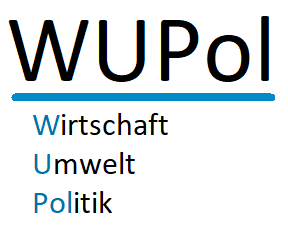Specialisation "Politics & Money"
Within WUPOL, you can choose the specialization “Politics & Money. Why choose this specialization?
The world we live in is complicated and uncertain. Geopolitical tensions between countries dominate the news. Within countries, populist movements threaten to undermine democracy. What connects all of these issues? Politics and Money!
<iframe allow="autoplay; fullscreen" width="640" height="360" src="https://planetestream.wu.ac.at/Embed.aspx?id=17224&code=c9~ub8yqkvUKITJdnazWfEXyjAxrU" frameborder="0" allowfullscreen></iframe>
The specialisation "Politics & Money" comprises the following four courses:
Course 1: Politics of FDI
This course examines how politics shape Foreign Direct Investment (FDI) and how FDI shapes politics. Understanding this interplay is important as it has implications for jobs and technological innovation - but also democracy and inequality. In this course, we analyze how politics influence the process of screening FDI in sensitive sectors. We examine how politics shapes firms’ investment decisions. We explore the effect of FDI on voters, workers, and domestic companies. We evaluate when foreign companies can undermine domestic laws via investment arbitration disputes. We study whether governments competing for FDI results in weakened labor protection laws.
Course 2: Politics of Finance
This course analyzes how politics influence banks and stock markets and how banks and stock markets influence politics. Investigating these interactions is important as it has implications for wealth and economic growth - but also whether politicians listen to money or voters. In this course, we study the conditions under which politicians should use taxpayer money to bail out banks. We analyze which banking regulations can ensure your money is safe and how crises like the 2008 Recession affected regulations. We analyze how elections and political movements like the Arab Spring affect share prices. We examine how regulation might move firms from maximizing short-term shareholder value to long-term sustainability.
Course 3: Politics of Trade
This course investigates how politics affect trade and how trade affects politics. Examining this interdependence is important as it has implications for the price of goods we buy and what we can purchase in the first place —-- but also for the future of the European Union, addressing climate change, and the outcome of international wars. In this course, we explain how trade, wages, and the rise of populists like Donald Trump are connected. We review how economic sanctions shape the outcome of international wars. We evaluate how China’s actions within the WTO revamp international trade cooperation. We investigate why Free Trade Agreements inspire large protest movements around the world.
Course 4: Politics of Debt
This course investigates how politics determine government debt and how government debt determines politics. Examining this relationship is important as it has implications for whether a default causes the next financial crisis --- but also whether debt-trap-diplomacy is effective or whether debt crises cause hunger and inequality. In this course, we analyze if loans could be used to fight climate change and poverty. We examine how interest groups shape the politics of obtaining loans. We evaluate the interplay of moral and economic arguments concerning debt relief. We study under what conditions IMF programs are effective. We investigate China’s Belt and Road Initiative in the context of international competition for political influence.
The four courses of the specialisation help you put all these events in context. We explore how citizens’ voting, firms’ lobbying, and governments' geopolitics shape our world.
Why choose "Politics & Money"?
Big issues are at stake. Democracy can only work if firms' lobbying activities do not undermine citizens’ votes. Inequality can only be addressed if politicians listen to voters instead of business interests. Geopolitical tensions can only be resolved if economic and political interests are balanced.
Key to understanding these dynamics is the behavior of politicians --- and their relationship to money. Who decides which bank gets a bailout and which one does not? Politicians! Who decides to implement tariffs and economic sanctions? Politicians! Who decides how Facebook and Google are regulated? Politicians! Take this specialization if you want to understand how public opinion, voters’ preferences, and lobbying activities shape politicians’ decisions and how they affect the economy.
The specialization will be useful for students who plan to continue their study at the masters level (e.g., political science, international economics; development) or develop a career path in the fields of consultancy, public institutions, and corporate strategy (e.g., corporate social responsibility, market analyst).
How to choose "Politics & Money"?
Starting with the winter semester 25/26, students will register for specializations via the new registration tool @myWU – Access to Specializations. Students select their degree program and choose from the list of available specializations – no need to enter a course number.
Important: Registration for the access to the specializations is exclusively done via @myWU – Access to the Specializations. Course registration itself continues to take place exclusively in LPIS. Once students have successfully completed an admission procedure (marked as “participated successfully”), they can select their specialization in the LPIS study plan and register for the respective courses there.
You can find all further information here: Access to the Specializations.
Key Learning Outcomes
The four courses will introduce students to the fundamental theories and concepts necessary to analyze the connection between politics and money in trade, investment, stock markets, banks, and debt. In addition, the four courses place much emphasis on developing three skills:
Thinking skills: The goal is to better understand the factors and mechanisms that influence the outcomes we observe. We focus on the ability to ask good questions by identifying puzzles where actors made different decisions despite similar circumstances. We then develop multiple explanations for the observed variation. Finally, we use appropriate methodological tools to identify the most convincing explanation and derive policy recommendations.
Doing skills: The specialization also offers the opportunity to improve writing and communication skills. We focus on the ability to communicate content to different types of audiences (internally within an organization vs. publicly to external stakeholders) using different types of media (text vs. audio vs. video). After completing the specialization, students will have created a portfolio of documents showcasing their expertise and skills to be included in future job applications. In addition, the specialization offers hands-on training in basic empirical qualitative and quantitative methods.
Character skills: Life is full of challenges. The key to success is learning how to overcome them. This requires resilience (capacity to withstand difficulties) and preserverence (persistence in doing something despite difficulty). We strengthen these skills by examining case studies without black-and-white answers or situations with incomplete information. The idea is to avoid becoming discouraged by challenges but instead to see them as learning opportunities.

